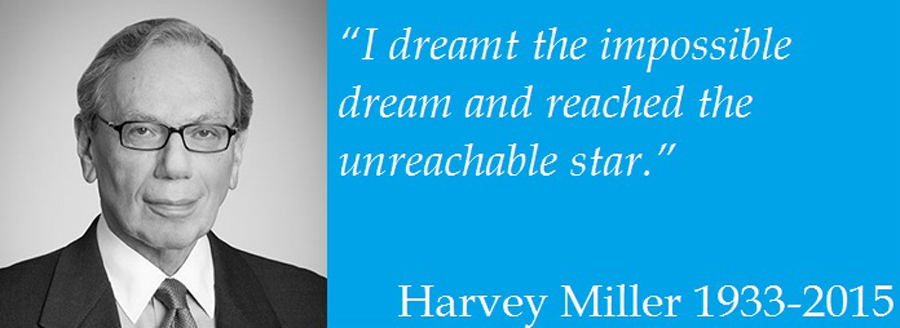
Weil's bankruptcy legend Harvey Miller reflects on his career in an interview with Chambers Associate back in 2012.
Renowned bankruptcy lawyer Harvey Miller sadly passed away on April 27, 2015, aged 82. We were privileged to interview him a couple of years ago, as the economy returned to growth in the wake of the Great Recession.
Starting out, what did you expect from a career in law?
Economic and intellectual satisfaction.
What do you consider to have been your big break?
After being adverse to Professor Charles Seligson, receiving an offer to be employed by him and his firm.
What differences do you see in today’s legal market compared to when you started?
A much more diverse world of legal services that has become highly specialized and dominated by mammoth international firms. That world is aggravated by a difficult and, perhaps, declining economic environment. The result is a more sharply competitive marketplace, as firms strive for market share. In addition, there has been a major increase in in-house legal staffs that include among their objectives in sustaining their positions the reduction of outside legal costs. Client loyalties have subsided in this environment, as cost has become a major factor.
What achievement are you most proud of?
I cannot single out one achievement as being the one I am most proud of. Among that group is the creation of a group of professionals that became the best qualified, most expert restructuring and reorganization group in the United States and materially contributed to making Weil a major legal institution. In addition, being instrumental in assisting companies in restructuring and resolving issues threatening their survival and preserving jobs and community interests has been most gratifying. Among those experiences are: Texaco, R.H. Macy & Co., Federated Department Stores, General Motors, Continental Airlines, Global Marine, Sunbeam Corporation and, in a somewhat different sense, Lehman Brothers.
What do you consider your greatest failure or regret?
I have always considered Eastern Airlines as my greatest failure. The inability to find the golden key to the reorganization of that airline was difficult to accept but, perhaps, inevitable. Overall, I don't have many regrets. In retrospect, there are a few legal arguments that I presented which, if I had the opportunity to do again, I might have presented in a different way.
"The scarcity of objective financing for distressed companies seeking to reorganize under Chapter 11 needs to be addressed."
What law would you want to change, abolish or create?
Chapter 11 of the Bankruptcy Code was enacted in 1978. It was intended to deal with an economy that was largely based on unsecured credit. The world has changed dramatically since 1978 in terms of technology and financing methods that have resulted in essentially all institutional and public debt being 'secured' that has shifted the balance in restructurings. The scarcity of objective financing for distressed companies seeking to reorganize under Chapter 11 needs to be addressed. The expansion of safe harbors that are beyond the jurisdiction of bankruptcy courts has aggravated that imbalance. There is a need to restore a balance among the protections given to debtors and the rights of secured creditors, if there is a continuing belief that restructuring and reorganization is a desired objective.
Who is your legal hero?
I have two: Professors Charles Seligson and Lawrence P King.
What career would you have in your second life?
Attorney.
How would you like to be remembered?
I dreamt the impossible dream and reached the unreachable star.
Why was Lehman the first casualty of the financial crisis?
Actually, the financial crisis preceded Lehman. Some would claim that Bear Stearns was the first victim, if you ignore the mortgage companies that fell by the wayside and real estate projects that collapsed. Lehman was the result of incompetence and lack of awareness on the part of the US Treasury, the Federal Reserve Bank, the SEC and, ultimately, the administration of President Bush. They failed to recognize that Lehman would be a spark that would ignite a worldwide financial meltdown, the likes of which had never been seen before. The consequences of that incompetence have not yet been erased and may linger for many years.